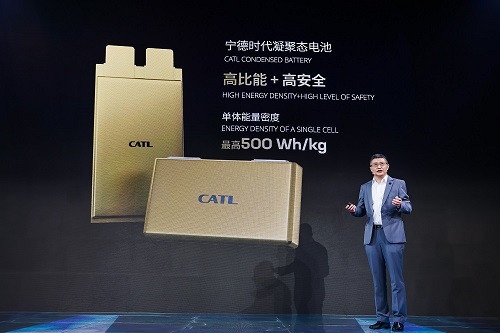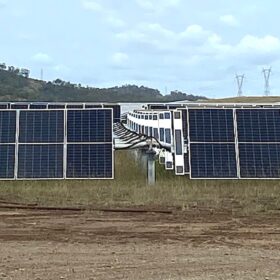From pv magazine Global
Chinese battery giant CATL on Wednesday unveiled a new ultra-high energy battery technology initially slated for aviation, and with an automotive cell under development.
The so-called “condensed matter” battery, a type of semi-solid state product with condensed electrolyte and new anode and separator materials, will have an energy density of up to 500 Wh/kg.
At the launch ceremony at the Shanghai auto show, Wu Kai, CATL’s chief scientist, said the company was working with unspecified partners to ensure the battery is qualified for aviation use in terms of safety and quality. CATL will also be able to start mass production of the condensed matter battery for electric vehicle uses later this year, Wu added.
The new battery leverages highly conductive biomimetic condensed state electrolytes to improve the conductive performance of the cells and in turn the efficiency of lithium-ion transport, while also boosting the stability of the microstructure.
The condensed matter battery is said to integrate “a range of innovative technologies, including the ultra-high energy density cathode materials, innovative anode materials, separators, and manufacturing processes, offering excellent charge and discharge performance as well as good safety performance,” CATL said.
However, no information has been revealed about the cost of the new cells, or the materials required to make them. A few other specifications, such as charging efficiency, charge/discharge rate, safety ranges, and life cycles, were also missing.
The Chinese battery manufacturer, which produced 37% of the world’s electric-vehicle batteries and 43.4% of energy storage batteries in 2022 for a grand total of 289 GWh, has made groundbreaking product announcements in recent years.
In 2021, CATL rolled out its first generation sodium-ion battery with an energy density of 160 Wh/kg and promised an increase to 200 Wh/kg for the next generation. Earlier this week, it confirmed that Chinese Chery will become the first automaker to use its sodium-ion battery tech.
In 2022, CATL unveiled Qilin battery, the third generation of its cell-to-pack technology, claiming the highest integration level to date. With a record-breaking volume utilisation efficiency of 72% and an energy density of up to 255 Wh/kg, Qilin is capable of delivering a range of over 1,000 km and equating to a five-minute hot start and ten minutes of charging to get from 10-80% state of charge.
The series production of Qilin started in March this year. These batteries have already been used in multiple electric vehicles from ZEEKR, AITO, Li Auto, and Geely.
On Tuesday, CATL also announced its targets to achieve carbon neutrality with all its battery manufacturing plants by 2025, and across its battery value chain by 2035.
To achieve this, the company will focus on reducing CO2 emissions in five key areas: mining, raw materials, battery materials, battery manufacturing and battery systems. “For CATL, achieving carbon neutrality is our responsibility, demonstrates our capability, and opens up more opportunities,” said CATL Board Secretary Jiang Li.
This content is protected by copyright and may not be reused. If you want to cooperate with us and would like to reuse some of our content, please contact: editors@pv-magazine.com.









By submitting this form you agree to pv magazine using your data for the purposes of publishing your comment.
Your personal data will only be disclosed or otherwise transmitted to third parties for the purposes of spam filtering or if this is necessary for technical maintenance of the website. Any other transfer to third parties will not take place unless this is justified on the basis of applicable data protection regulations or if pv magazine is legally obliged to do so.
You may revoke this consent at any time with effect for the future, in which case your personal data will be deleted immediately. Otherwise, your data will be deleted if pv magazine has processed your request or the purpose of data storage is fulfilled.
Further information on data privacy can be found in our Data Protection Policy.